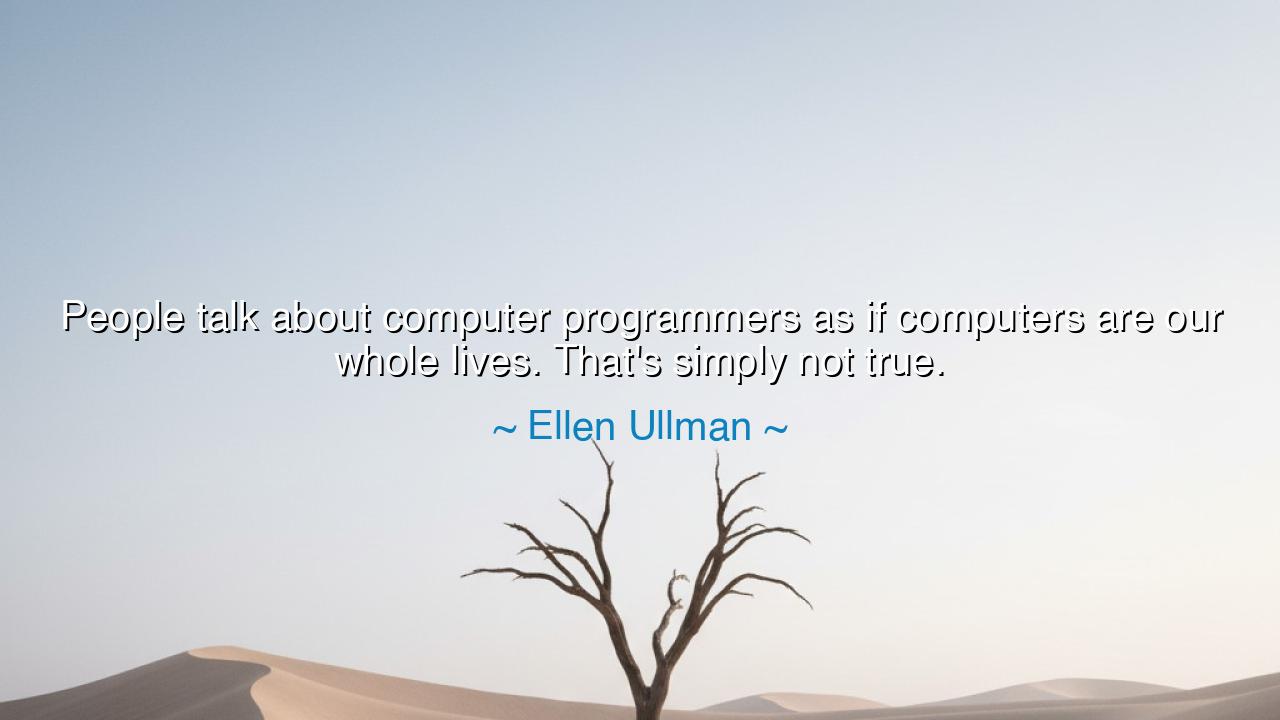
People talk about computer programmers as if computers are our
People talk about computer programmers as if computers are our whole lives. That's simply not true.






Hearken, O children of generations yet unborn, and attend to the words of Ellen Ullman, who spoke with clarity and balance: “People talk about computer programmers as if computers are our whole lives. That's simply not true.” In these words lies a meditation on human identity, balance, and the essence of mastery, a truth as enduring as the reflections of the ancients on the harmony between work, learning, and the wider life of the soul.
Consider first the misconception of total immersion. Ullman observes that outsiders often assume that those who master a craft are consumed entirely by it. Yet history teaches that mastery does not demand the annihilation of other interests; it thrives when intellect, curiosity, and creativity are nourished by diverse pursuits. The philosopher-king, the scholar, and the artist all knew that breadth of experience strengthens depth of skill. The programmer, like the scribe or engineer of old, is enriched by the world beyond the tools of their trade.
The words underscore the humanity of the craftsman. Programmers, though intimately acquainted with lines of code and the logic of machines, live, love, and think beyond the circuits. Consider Leonardo da Vinci, who mastered anatomy, mechanics, and art simultaneously. His life was not consumed solely by invention or painting; his breadth of experience deepened his genius. Ullman reminds us that even in the digital age, mastery flourishes not in isolation, but in dialogue with life itself.
Ullman also challenges the notion of identity as singularly defined by work. The public may see the programmer as bound to the machine, yet programmers cultivate relationships, passions, and reflections that enrich both their craft and themselves. In ancient times, the scholar who mastered mathematics, rhetoric, and philosophy was valued not merely for technical skill but for wisdom, judgment, and the capacity to engage with society. Similarly, the programmer’s life extends beyond screens and algorithms.
Consider the story of Grace Hopper, a pioneer of computer programming. Though her work with COBOL and early computing was groundbreaking, she also traveled, taught, and inspired generations, blending technical mastery with human connection. Her life exemplifies Ullman’s insight: one can dedicate oneself to a craft without being consumed by it, drawing inspiration and balance from the wider world.
From this reflection emerges a timeless lesson: do not let work define your totality, but integrate it within a life rich with varied experiences. Mastery is deepened when nourished by culture, friendship, travel, art, and reflection. Ullman reminds us that balance is essential to sustain passion and creativity over a lifetime, and that identity is woven from many threads, not a single strand.
Practical action flows naturally from this wisdom. Cultivate your craft diligently, but also devote time to the pursuits that stir the soul: reading, music, conversation, exploration, and contemplation. Allow these experiences to inform and inspire your professional life. Balance fosters resilience, creativity, and enduring engagement, making the work not a chain but a conduit for expression and fulfillment.
Finally, remember the eternal truth: humans are not defined solely by what they create or the tools they wield. Ellen Ullman’s words are a call to holistic living: embrace your craft, yet live beyond it; let your life be a tapestry of passions, experiences, and connections, for only then can mastery coexist with humanity, and fulfillment endure across the span of years.
If you wish, I can also craft a narration-ready version of this reflection, with natural rises and falls that evoke the emotional and philosophical depth of Ullman’s insight.






AAdministratorAdministrator
Welcome, honored guests. Please leave a comment, we will respond soon